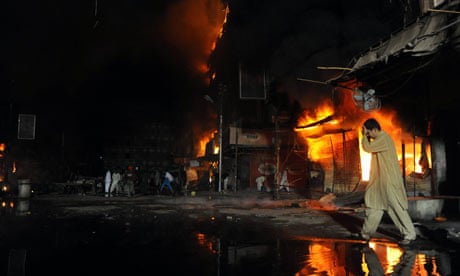A record number of Pakistani civilians and security forces died in militant violence last year as the country reeled from an onslaught of Taliban suicide bombings that propelled it into the ranks of the world's most perilous places.
Pakistan saw 3,021 deaths in terrorist attacks in in 2009, up 48% on the year before, according to a new report by the Pakistan Institute for Peace Studies (PIPS), an Islamabad-based defence thinktank. Researchers counted a total of 12,600 violent deaths across the country in 2009, 14 times more than in 2006.
At least half of the dead were militants who were killed in US drone strikes or, mostly, sweeping army offensives against their mountain strongholds of Swat and South Waziristan along the Afghan border. Another 2,000 or so Pakistanis died in bloodshed unrelated to militancy: political clashes, tribal feuds and border skirmishes.
In comparison just over 2,000 civilians were killed in war-torn Afghanistan during the first ten months of 2009, according to the UN. In Iraq 4,500 civilians were killed during the year, said Iraq Body Count, an independent monitoring organisation.
The high militant death toll in Pakistan was driven by the army operations, although battlefield casualty figures are notoriously difficult to confirm. The army dislodged the Taliban from their Swat stronghold but failed to capture the local leader, Maulana Fazlullah, who reportedly slipped into Afghanistan.
In October the army moved into South Waziristan, capturing roads and towns but not the militant leadership, which is thought to have moved into North Waziristan, a hornet's nest of militancy, where speculation is growing that the army will open a third front.
The army has failed to stop the suicide attacks, which surged by one third to 87 bombings that killed 1,300 people and injured 3,600. PIPS researcher Abdul Basit said the militants were using "innovative tactics" such as targeted assassinations, kidnapping and the use of sophisticated bomb materials. "This year they were more technologically savvy," he said.
The strife is frazzling public opinion. A recent Gallup poll found that four-fifths of Pakistanis feel unsafe in public. "Life has completely changed for everyone," said Ali Mustafa, a doctor whose best friend was gunned down during a "swarm" attack on a Rawalpindi mosque in December.
The new year started as badly as the last one ended: a Taliban suicide attack on a volleyball match near South Waziristan on January 1 killed over 90 people. In recent days, Karachi has been wrenched by a spate of politically driven killings, unlinked to Taliban militancy, that have killed about 40 people.
Imtiaz Gul, author of a book on militancy, said that although only a small number of al-Qaida fighters were hiding in Pakistan, the group provided the inspiration for much for the mayhem. "What we see in this region right now is a fusion of interests and ideologies," he said. "Al-Qaida is connecting people."
The tight bond between homegrown and foreign militants was underscored at the weekend when a video emerged showing the Taliban leader, Hakimullah Mehsud, sitting beside Humam Khalil Abu Mulal al-Balawi, the Jordanian suicide bomber who killed seven CIA operatives at a base in southern Afghanistan on December 30.
Pakistan has become a magnet for aspiring jihadis across the world, partly thanks to the power of the internet. Yesterday five young American Muslims went on trial in the eastern city of Sargodha. They are accused of coming to the country to try and plot terrorist attacks. The men deny the charges.
